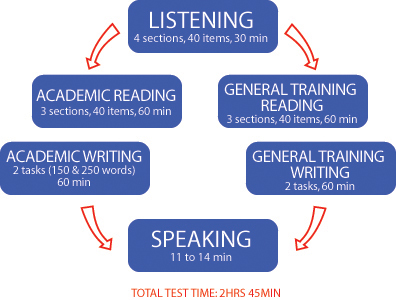- If your purpose of taking IELTS is to study or work in more technical organizations in English speaking countries like USA, Europe, Australia, you need to take the academic test.
- For people who are looking to emigrate, usually the General test is required.
 The Listening and Speaking sections remain same in both the versions, however reading and writing modules are more comprehensive in the General test. It is always recommended to check with your company, university or the immigration office about the version required by them.
The Listening and Speaking sections remain same in both the versions, however reading and writing modules are more comprehensive in the General test. It is always recommended to check with your company, university or the immigration office about the version required by them.
- An IELTS application form which you can also apply online in India -- This can be found at https://ielts.britishcouncil.org/india
- Two recent passport sized photographs
- A copy of your passport or national ID card (original must also be presented)
- A copy of your recent IELTS test score if you have taken the test before
- IELTS Tuition or Coaching Centers**: There are many coaching centers and individual tutors that provide training and you can enroll in one such coaching center for the preparation.. Joining coaching classes also helps you interact and benchmark with more students taking this exam. Just make sure you select the one that suits your requirements.
- Online Tutoring**: Various websites and individual tutors offer online tutoring for IELTS. Your online tutor will evaluate and send feedback to your assignments. Some websites offer face to face communication with the online tutors that help you to improve your speaking and listening skills.
- Self-Study using Study Material: A plethora of study material (books and CDs) is available in the market and on the internet. You can find previous examination papers as well. There are free e-books, test papers and materials available online. However, if you are not confident or do not have a good competency in the language, it may be more useful to take personalized coaching.
- Speaking Section (11-14 mins) evaluates a candidate’s oral abilities like Fluency and Coherence, Vocabulary, Grammatical Range and Accuracy and Pronunciation. All criteria are equally weighed.
- Listening module (30 mins) will evaluate your understanding of English as will be used by the native English speakers in social and everyday use.
- Reading Section (60 mins) will evaluate your understanding of the main point or points being made in the paragraphs and analyse them with given information.
- In the Writing module (60 mins), Task Response, Coherence and Cohesion, Vocabulary and Grammatical Range and Accuracy have equal weightage.
- Use a variety of sentence patterns. Of course, using simple sentences helps reduce grammatical errors. However, it won’t impress the examiner.
- You can use different techniques for combining two simple sentences. For example, relative pronouns who, which can be used to combine clauses. Likewise, participles infinitives, and if -- clauses can also be used to combine simple sentences
- One hour is allotted for writing test. Complete the first task within 20 minutes and focus on the essay part as it carries more points.
- Don’t use informal language and contractions.
- Divide the essay into paragraphs and discuss one idea in one paragraph.
- Spare a few minutes to proofread your letter and essay.
- Pay attention to subject -- verb agreement, word combination with preposition.
- Start with the easiest question and don’t spend much time on any question.
- There is no negative mark for incorrect answers. So, even if you can’t find the answer from the passage, try to guess and attend all questions.
- Learn how to skim a page. Good scanning skills help know the content of the entire passage, even without reading it carefully. So, practice to develop scanning skills.
- Skip the unfamiliar words. You need to know the essence of the passage only.
- While answering, be careful with spelling, and grammar.
- Before the beginning of each section, you will get time to read the questions. It is important to utilize this time in reading the questions carefully to do well in the next section.
- Write down your answers in the listening booklet next to the appropriate questions.
- No need to copy the answers on the answer sheet between two sections. 10 minutes will be given to transferring the answers from the listening booklet at the end of the listening test.
- Take IELTS listening practice tests to become accustomed to the style of speaking as recorded in the conversations and the type of questions asked.
- Listen to the questions carefully.
- Keep talking and avoid long pauses
- Be acquainted with the format: The foremost thing is to be aware of the test format. Read the information for candidate booklet and familiarize with the test format. Be aware of the duration of each test, number of questions to answer, what the examiners looking for in writing and speaking tests etc.
- Practice Sample tests: Practicing sample test papers help you build up your speed. By taking sample tests, you will become more confident and can able to identify your weak areas.
- Try to use English every day. Speak English with your friends and family. Read English newspaper, magazines. Listen to English shows, films. Reading subtitles help you to improve your language.



